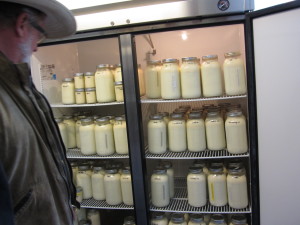The documentary GMO OMG had its Colorado premiere at Boulder Theater on Tuesday night. Filmmakers Jeremy Seifert and Joshua Kunau held a Q&A session, moderated by Kelly Shea of WhiteWave Foods, following the film. GMO OMG explores director and father Jeremy Seifert’s journey to learn the science behind Genetically Modified Organism (GMO) crops, and the influence of corporate giants like Monsanto, Syngenta, Dow, Bayer and others over the commercial farming industry in the U.S.
Perhaps the most poignant quote of the night was displayed on screen, “GMOs are a ‘new form of slavery'”, quoting a Vatican official in January, 2012. The film gives the facts: commercial farmers who plant GMO seeds do not have the liberty to save seeds to use for the following season, because the genetic modifications to the seed are patented. In fact, farmers who did not plant GMO seeds were also affected by drift of pollen from GMO crops, which caused their crops to incorporate genetically modified DNA. Monsanto and friends subsequently threatened these farmers with lawsuits, unless they signed an agreement to purchase and plant GMO seeds in their fields.
GMO seeds come at a higher cost than traditional seeds, requiring farmers spend more to plant their fields. The seeds are then accompanied by a cocktail of herbicides (sold by the same companies) that suppress growth of anything other than the GMO seeds. The result has been the killing off of one of our most important resources, topsoil. Biological diversity sustains life, soils, and healthy ecosystems. Monocropping with GMO seeds is an unsustainable, short-term food supply solution that will be far more detrimental than beneficial to humans and the planet in the long term.
Seifert traveled to Haiti, where farmers were offered a $4 million donation of Monsanto seeds from USAID following the earthquake of 2010. Farmers organized to protest the donation, likening the donation to “death”, as it would end the sacred cycle of seed saving. Protesters carried signs with slogans such as, “Long live local seeds!” They chose to burn the Monsanto seeds as a sign of protest to the gift that could threaten their traditional agricultural systems. It was interesting to see the contrast between Haitian farmers and conventional commercial farmers in the U.S., who Seifert also interviewed.
In addition to the question of the safety of genetic modifications to the plants, such as GMO corn, which has not been adequately tested (our government trusted a 3 month study from Monsanto that has not been peer-reviewed?), genetic modifications allow for spraying of herbicides such as glyphosate (RoundUp), with no harm to the crop itself. GMO corn, sold by Monsanto, is genetically engineered to express toxins from Bacillus thuringiensis (Bt), a commonly used biological insecticide. The difference is: this is not a treatment that is sprayed on the corn, and then washes away. It is expressed in the cells of the corn plant. The result is a concentration of pesticide that is 1000 times higher than what would normally be present with a spray treatment. While the genetic modifcations may produce short-term increased yields, these practices are not sustainable. Plants and insects that are resistant to both RoundUp and Bt are increasing yearly. Furthermore, a Canadian study has shown Bt toxin and the metabolite of glyphosate circulating in the bloodstream of pregnant women, their fetuses, and non-pregnant women. Read the study for yourself, published in the journal Reproductive Toxicology. The study authors conclude that these toxins may not be effectively cleared in humans, and there may be a high risk of exposure from meat from “factory farmed” animals fed GMO corn.
Hey, USDA! I thought you were supposed to be protecting our food supply? This does not sound safe for any of us.
Oh, wait; that’s right; many top USDA officials are former Monsanto employees.
Seifert visited Rodale Institute, where farmers have performed 30 years of organic trials. The results of their studies ring clear: organic farming can be equally productive to commercial farmers planting GMO seeds. Organic farmers have full liberty to save seeds and re-plant the following season. This practice preserves heirloom vegetable varieties that are at threat. Organic farming also reduces farm worker and consumer exposure to chemicals. The produce tastes great, and it is good for you. Kelly Shea pointed out they have a saying at WhiteWave Foods, “The conventional farmer of today is the organic farmer of tomorrow.”
Perhaps the most touching part of the film is Seifert’s son, Fen, and his obsession with seed saving. His interest started at the tender age of 3 years old. He was fascinated by the Seed Savers Exchange catalog, and regularly saves seeds from the family garden. Upon visiting the SSE site in Iowa, Fen jumps out of the car in delight, as one of his childhood dreams comes true.
I did not know what to expect going to this film. Honestly, the title GMO OMG seemed a bit gimmicky; but, both my skeptical friend and I left feeling this was a great film.
This documentary is well-balanced, honest, and necessary. The filmmakers hope it will be something that enlightens both consumers who do care, and more importantly, those who don’t care. As Kunau pointed out in the Q&A, it is hard for people to take a long term view. But for every person who has a child they care about in their lives, this film is sending an important message. Our spending power carries weight, and may be our best form of protest. Opting to support local organic produce puts our food dollars in the hands of people who care to protect the health of people and the planet in the long term, ensuring a safe and healthy food supply for future generations. We can invoke change with “awareness, choice, and power in numbers”, succinctly put by Kunau.










